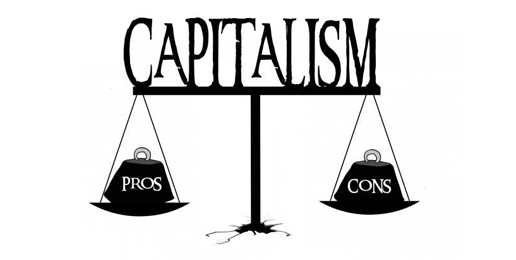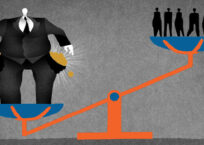
Bernie Sanders, a socialist and U.S. Senator from Vermont, doesn’t like capitalist economics. Visiting the Pope in 2016, he made some serious accusations.
I told him [the Pope] that I was incredibly appreciative of the incredible role that he is playing in this planet in discussing issues about the need for an economy based on morality, not greed…[i]
Doubling down, Bernie went even farther:
At an economic conference held at the Vatican, Bernie Sanders found occasion to denounce capitalism. “At a time when so few have so much, and so many have so little, we must reject the foundations of this contemporary economy as immoral and unsustainable.”[ii]
Even if we don’t like his politics, suppose that he is right. What if capitalism really is immoral. Shouldn’t Christians then be working to make things right? This article explores capitalism and economic immorality. It aims to:
- Define capitalism, so that we can agree on is being discussed.
- Examine what it means to have morals in an economic system.
- Discover what the Bible has to say about property, economics, and morals.
- Look at the American economy, seeking patterns of economic injustice.
- Give thought on ways to fix patterns of economic injustices.
Capitalism in two minutes
To frame this discussion of capitalism we need a definition. According to one dictionary, capitalism is:
“an economic system characterized by private or corporate ownership of capital goods, by investments that are determined by private decision, and by prices, production, and the distribution of goods that are determined mainly by competition in a free market.”[iii]
This definition implies:
People are allowed, even encouraged, to own things, tangible and intangible, useful for producing other things. A person always can use his or her own labor, ideas, and creativity. A person may also own the means of production: farms, mines, factories, and warehouses stuffed with useful items. Money stored in bank accounts is also good, for it can be used to acquire the means of production.
An owner gets to choose what happens to his or her property. What a person owns, or can produce, can be sold or gifted to others. It can even be kept idle, producing nothing. All of those choices are good.
Some people will become wealthy, but others won’t. When people have the freedom to apply talent, industriousness, social connections, and “luck” to their endeavors some of them will succeed and others will fail. Importantly, the successful people are allowed to keep their gains.
Capitalism has no built-in morals
The concept of capitalism is simple and short. It basically says that people can own things, and exchange ownership of their things. There is nothing there about morals, nothing prescribing prices, defining contract law, or prohibiting certain activities.
Economic morals come not from theories, but from application of that society’s morals and ethics. For example, a society that prohibits armed robbery will also condemn theft by way of dishonest weights and measures (Proverbs 16:11). Since discussion only of capitalist theory would make for a really short article, we’ll continue by concentrating on the American expression of capitalism.
When a society’s morals change then the marketplace soon reflects the changes. Here is an example from our too-recent past.
- Early in the 19th century United States law permitted importing slaves from Africa.[iv] A slave buyer from America could go to Africa and purchase slaves from a seller. Buying foreign slaves was socially and economically acceptable for American society, at least in some states. Selling slaves to Americans was acceptable to this African society.
- In 1808 it became socially and legally unacceptable to buy and import slaves into the United States.[v] The practice was outlawed, and ceased, because of our society’s new morals, which were applied to the marketplace. However, African sellers stayed in business, for selling slaves was still acceptable to their society.[vi]
In this example the American and African societies expressed different moralities on the same topic, slavery and slave trading. It shows that you can’t usefully judge a society’s economic morality without also considering its general morality.
What does the Bible have to say about property and capitalism?
The Bible instructs us in righteous living. And unless you’re a hermit farmer, its instructions also cover the economic interactions you have with others. In fact, the Bible has over 2000 verses dealing with money.[vii] What does the Bible have to say about owning property?
God gave Adam and Eve the right to own things. God created everything, and still owns everything (Deuteronomy 10:14; Psalm 24:1; Psalm 50:12; 1 Corinthians 10:26, etc.). He delegated His ownership authority to Adam and Eve, giving them, and their descendants, dominion and the right to rule (Gen 1:28-30).
Mankind practiced capitalism from the very beginning. Cain was a farmer, Abel a shepherd. Each sacrificed to God out of his own provision, not from some community pool (Gen 4:2-5). They individually enjoyed the rights of private property and capitalism. After all, farms and flocks are means of production and thus capital goods.
The New Testament affirms private ownership. When Jesus warns us to store up treasures in heaven, He acknowledges that people can, and do, own treasures here (Matthew 6:19-21). He didn’t tell all of us to abandon them, but rather to use them as tools and not be enslaved to them (Matthew 6:24). The warning “For what does it profit a man to gain the whole world, and forfeit his soul?” (Mark 8:36) speaks of a common understanding of capitalist principles. To the people of Jesus era, capitalism was likely the only economics they knew.
Early in the Jerusalem church its people pooled their goods for the common good, selling property and land for the needs of the saints (Acts 2:43-45; 4:32-35). Yet communal life wasn’t the norm for Christ’s church. For example, Paul encouraged to the Corinthian church to prepare a gift they promised for the benefit of the Jerusalem church (1 Corinthians 16:1-4; 2 Corinthians 8:2, 6-8). If the Corinthians were living communally then Paul could have simply asked the elders about the gift. This means that members of a congregation may choose to act communally, but they aren’t obligated to do so.
It is OK to be wealthy. The Bible has no problem with a person being wealthy. Look at Abraham, who found favor with God (Genesis 12:1-3). He was blessed with enormous wealth (Genesis 13:2), so much so that it took a literal army to properly care for it (Genesis 14:14).
It was also OK to be wealthy even if you weren’t Abraham. When Moses was done leading Israel through the wilderness he lectured them about the kind of land they were to occupy and enjoy.
- They would occupy towns and homes they didn’t have to labor over, and eat from orchards they didn’t have to plant (Deuteronomy 6:10-15).
- They would have an abundance of crops, flocks, and children, along with the health to enjoy it all (Deuteronomy 7:12-16).
- They would have abundant land for farming and shepherding, with minerals to mine, refine, and use in factories. (Deuteronomy 8:6-10).
After being set up so nicely, all that they then had to do was to devote themselves to the Lord. Over time Israel failed to do that and had an up-and-down history.
The New Testament also has wealthy people, even wealthy Christians.
- Jesus challenged a man to give up his wealth. He saw it as a snare to the man’s devotion to God. The problem wasn’t that he was wealthy, but that the wealth was the man’s master. (Luke 18:18-27).
- Philemon had at least one slave, indicating a large, wealthy household. Paul encouraged him to free his slave Onesimus. But he was OK with Philemon’s wealth. If he wasn’t then Paul would have also rebuked him for being rich (Philemon 1:18-20).
- James admonished men going on a business trip. The problem wasn’t their occupation, but that they wouldn’t acknowledge the God who directs their steps (James 4:13-15).
In the Bible we see some people thrive with wealth. It is a blessing to them. Other people get rich and it warps them into selfish oppressors. We see how wealth can corrupt (1 Timothy 6:9-10) and cause the possessor to worship their treasure rather than God who provided it (Luke 16:13).
What does the Bible have to say about the responsibilities of wealth?
Has God blessed you with wealth? Do you get regular meals, a good job, a place to call your own home? Very good. Is God pleased with how you handle your bounty? Or are you only vaguely aware that with wealth comes responsibility (Luke 12:48).
Here are some of the Bible’s charges regarding wealth.
Don’t trust in your wealth. Wealth has its uses, but you can’t eat gold during a famine (Genesis 47:15). What you have saved can be taken from you by thieves or armies. And your wealth won’t help you at all when you die – you can’t take it with you (Luke 12:15-21). You need to look to God to provide for your needs (Luke 12:28; Philippians 4:19).
Don’t use your wealth and position to subvert justice. Those with wealth and influence can influence leaders and judges to achieve more favorable outcomes. The Bible shows this, how David tried evading acknowledging his adultery with Bathsheba (2 Samuel 11:1-4, 14-17), and how Ahab acquired Naboth’s vineyard by arranging a lynching (1 Kings 21:8-16). Judges are to be upright and honest (Exodus 23:6-7; Isaiah 1:26), not favoring the rich or the poor (Exodus 23:1-3; Leviticus 19:15; Deuteronomy 1:16-17; Proverbs 18:16), and never open to bribes (Exodus 23:8; Proverbs 17:23).
Have honest business practices. Honesty isn’t just a personal ethic (Exodus 20:15, Proverbs 22:22-23). It also covers how you gain your wealth, and how you run your business.
- Do you delay paying your bills? It gooses your cash flow, but it also cheats your creditors of the payments they need today (Leviticus 19:13; Deuteronomy 24:10-13; Deuteronomy 25:13-15; Jam 5:4).
- Shortchanging your customers is not only dishonest but theft (Leviticus 19:35-36; Deuteronomy 25:13-15; Proverbs 11:1; Proverbs 20:10; Amos 8:4-8).
- You can stretch expensive supplies by “watering it down.” But diluting or adultering food and medicine is theft by misrepresentation and shortchanging. It can also sicken or kill those who consume your products.
- Counterfeit parts are low-quality products represented to be the genuine article. When counterfeit parts are installed in high-stress situations, where a high-quality part is expected and needed, it can cause accidents and death.
In brief, be a straight shooter (Matthew 7:12). Knowing the right thing, and then doing it, might cost you your job. But it also might save lives, and certainly save your conscience.
Be generous to those in need. The Bible reminds us to be generous to those in need (Deuteronomy 15:7-8; Matthew 25:31-46; 1 Timothy 6:17-19; Hebrews 13:16; James 2:15-16). And not just generous, but cheerfully generous (Deuteronomy 15:10; 2 Corinthians 9:7). You’re cheerful because you’re using God’s grace to you to help someone else, effectively sharing the Gospel in a practical manner. You’re mastering your wealth, rather than the other way around.
We also learn whom to be generous to.
- Support your family, including your extended family (Exodus 20:12). Jesus criticized those who wouldn’t support their parents, who instead devoted resources for Temple use (Mark:7:9-13). If we support church ministries, but not our family members who are in material need, then we’re doing things wrong. Charity begins at home (1 Timothy 5:3-4).
- Support the church. In Paul’s letters a recurring theme is collecting for the saints in Jerusalem (Romans 15:25-27; 1 Corinthians 16:1-4; 2 Corinthians 8:1-6; 2 Corinthians 9:1-4). Paul himself is supported by the Macedonians, who were poor and yet generous in support of spreading the Gospel (2 Corinthians 11:7-9).
- Support your neighbor. Jesus’ parable about the Good Samaritan (Luke 10:29:37) shows that Christians shouldn’t limit their help to just their physical neighbors, or confine it to other Christians. Yet understand that in your charity you’ll have to learn how to tell the needy from the deceivers. You ought to be working to get needy people “on their feet” again, and not merely easing your conscience by flipping a few dollars their way.
The rich and the poor alike can have a generous heart. The Macedonians were very poor, and yet dug deep for the church in Jerusalem out of heartfelt concern (2 Corinthians 8:2-3). You’re never so poor that you’re disqualified from caring. The degree of your generosity is something you can discuss with God.
For a deeper discussion on wealth and its responsibilities, visit the web sites referenced in this end note.[viii]
Selected success stories of repairing American capitalism
The Bible says the wealthy are to be honest, not influencing officials to favor them versus the poor. These warnings also apply to businesses. They could easily defraud their customers through false weights or adulterated products. And they could oppress their own workers by misusing the employer / employee relationship.
American business practices haven’t always been the finest examples of applied Christianity. But America has also been open to reforming, collectively willing to see our errors and change. Here are some past examples of successful changes in economic morality.
- Occupational safety: Whether at a factory or construction site, work activities can be dangerous. Examples include machines with exposed moving parts, fumes or dust that damage workers’ lungs, and inadequate fire exits.[ix]
But adding safety guards, and implementing safety procedures, increase operating costs. This puts a safety-minded producer at a price-competitive disadvantage with less scrupulous competitors (Exodus 21:28-36; Deuteronomy 22:8). Without external pressure, whether moral, economic, or legal, worker safety loses out.
Since businesses were unable to collectively reform on their own initiative, activists campaigned for safety laws. After about sixty years of effort, by 1948 all the U.S. states had workplace safety laws and workmen compensation laws.[x]
- Child labor in factories: In the 1800s children were encouraged to work in factories, sometimes alongside their parents. Although it may have increased the family income, it also kept the children out of school and stunted their adult career possibilities.
After many years of passing child labor laws, only to have them struck down, those passed in 1938 stuck. These laws, in addition to side effects of the Great Depression, effectively ended the employment of children in factories.[xi]
- Food and drug laws: In the 1800s an increasing amount of our food was processed and packaged in factories. With the processing hidden from consumers, unscrupulous vendors did much to cheapen the products, yet selling them as the genuine article. For example, diseased or rotten meat was disguised to seem good. These business practices were unhealthy for consumers, and robbed them by not providing the purity or quantity they paid for.
Although food safety activists had campaigned for decades to implement food purity and inspection laws,[xii] nothing substantial happened until the author Upton Sinclair published his novel The Jungle.[xiii] He hoped that his expose of horrific conditions in meat packing plants would promote a socialist revolution. What actually transpired was a successful push for increasingly effective food and drug laws.[xiv]
These examples show a pattern for getting the desired social change. Mere moral outrage doesn’t produce the desired change in society. Rather, persistent argument works to change individual beliefs. Eventually enough people believe that the complaint has merit, and social pressure results in a permanent individual behavior change. Usually the social pressure is reinforced with legal sanctions having a painful bite.
How to fix an economic immorality
In the past, Americans responded to patterns of unjust business practices and fixed them. But do we still have the ability to overcome such challenges? Let’s examine something that I think should get changed, a form of worker oppression. We’ll discover how could we change our attitudes and behaviors to eliminate it.
A sweatshop is “a factory or workshop, especially in the clothing industry, where manual workers are employed at very low wages for long hours and under poor conditions.”[xv] Frequently these factories have dangerous workplace conditions. In the United States corrective labor laws have almost eliminated sweatshops.[xvi] Some of this change is through improved working conditions, but the biggest reduction is caused by this sort of work having moved to foreign factories.
A problem with this job export is that workplace conditions in these factories are worse than we ever imagined. Many articles show that these foreign factories make their employees work long hours,[xvii] in unsafe workplaces,[xviii] while spewing pollution into the neighborhood.[xix] Americans get cheap fashion and these workers pay for it with their health, even their lives.
This is really an American economic scandal because we’re hiring these factories. We’re letting them sin on our behalf, by contracting for goods at prices we know are too low to provide decent working conditions.
Suppose a factory were to change things to provide a better worker experience. Those changes would raise its production costs. However, their American buyers won’t accept those higher costs and would move their business elsewhere. So, instead of making changes, they merely cheat at workplace inspections and keep abusing their workers.[xx]
We shouldn’t turn a blind eye to how our goods are made. We mustn’t accept ruining someone’s health just to get inexpensive clothes and toys. How can we go about fixing things?
Recognize that there is a problem. Acknowledge that there is a problem with these imported goods, then tell others. No significant changes will occur until there is a critical mass of people demanding them.
Pay more to patronize the good guys. Learn which firms insist on better labor conditions, then give your business to them. Hewing to something like a “Healthy Workplaces Seal” creates public opinion about the issue. Be willing to pay a premium for such goods, for merely seeking the lowest price is how the foreign sweatshop problem got started.
Criticize the bad guys. Investigate business supply chains, and shame those who keep using oppressed labor. See through those cover-up reports that hide workplace problems. This is the flip side of patronizing the good guys. No business wants bad publicity.
Get the government to lean on the bad guys. We can’t prosecute foreign producers for not hewing to American workplace or environmental standards. But we can sanction their imports. Create a foreign EPA, a foreign OSHA, inspecting their factories and supply chains. Their findings can lead to punitive tariffs. If a factory won’t spend for safety or cleanliness, why should they pocket their savings? They’ll soon learn to spend on health and safety, rather than lose their business, or line Uncle Sam’s wallet.
As with other social change campaigns, expect that this effort will require long, persistent effort before there are signs of success. By the way, can someone tell me where to get shirts made with the “Healthy Workplaces Seal?”
Conclusions
Let’s return to our original question: Is capitalism immoral? No, it isn’t. The Bible likes private property ownership, and endorses capitalism.
A more pointed question is: Can there be immorality in society’s capitalism? But of course! This article has shown many examples of this in American economic history. It comes about because society is, or was, willing to tolerate immorality.
A society’s morals are the collective result of individual morals. There isn’t an amorphous “it is society’s fault,” where we get to blame our environment for our own attitudes and deeds. Each of us are responsible for our own sins, our own failings. The great thing about this is how we can change and learn to act more morally. Changing beliefs and behaviors is the beginning to fixing any social, or economic, problem.
Footnotes:
[i] Nichols, John, Bernie Sanders Went to Rome to Discuss the Immorality of Unfettered Capitalism, The Nation, April 17, 2016, https://www.thenation.com/article/bernie-sanders-just-met-with-pope-francis-to-discuss-the-immorality-of-unfettered-capitalism/
[ii] Ibid.
[iii] https://www.merriam-webster.com/dictionary/capitalism
[iv] Smith, George H., The Slave Trade and the Constitution, Libertarianism.org, September 29, 2017, https://www.libertarianism.org/columns/slave-trade-constitution
[v] US law abolishing transatlantic slave trade takes effect, Oxford University Press, January 2, 2012, https://blog.oup.com/2012/01/slave-trade/
[vi] Sieff, Kevin, An African country reckons with its history of selling slaves, Washington Post, January 29, 2018, https://www.washingtonpost.com/world/africa/an-african-country-reckons-with-its-history-of-selling-slaves/2018/01/29/5234f5aa-ff9a-11e7-86b9-8908743c79dd_story.html?noredirect=on&utm_term=.7f453fdfe6fb
[vii] Brown, Chris, 3 Things the Bible Says About Money, Stewardship, May 21, 2015, https://www.stewardship.com/articles/3-things-the-bible-says-about-money
[viii] These web pages are well-composed summaries of Bible teaching on wealth and its responsibilities. They’re worth visiting.
- What Does the Bible Say About Money and Wealth?, Christian Bible Reference Site, https://www.christianbiblereference.org/faq_money.htm
- What Does the Bible Say About Generosity and Duty to the Poor?, Christian Bible Reference Site, https://www.christianbiblereference.org/faq_generosity.htm
- Sunshine, Dr. Glenn, Rich and Poor 2, Institute For Faith, Work & Economics, May 29, 2012, https://tifwe.org/rich-and-poor-2/
[ix] Brown, Don, 3 TURNING POINTS IN THE HISTORY OF WORKPLACE SAFETY, BasicSafe, August 5, 2014, https://info.basicsafe.us/safety-management/blog/3-turning-points-in-the-history-of-workplace-safety
[x] Aldrich, Mark, History of Workplace Safety in the United States, 1880-1970, EH.Net Encyclopedia, August 14, 2001, http://eh.net/encyclopedia/history-of-workplace-safety-in-the-united-states-1880-1970/
[xi] Child Labor in America: History, Policy, and Legislative Issues, EveryCRSReport, February 9, 2005 (revised through November 18, 2013), https://www.everycrsreport.com/reports/RL31501.html
[xii] Saxowsky, David, Milestones in U.S. Food Law, North Dakota State University, https://www.ag.ndsu.edu/foodlaw/overview/history/milestones
[xiii] https://en.wikipedia.org/wiki/The_Jungle
[xiv] Pure Food and Drug Act: A Muckraking Triumph, United States History, https://www.u-s-history.com/pages/h917.html
[xv] https://en.oxforddictionaries.com/definition/sweatshop
[xvi] Segment hosted by Zwillich, Todd, When ‘Made in America’ Means Made in Sweatshops, WNYC, September 11, 2017, https://www.wnyc.org/story/when-made-america-still-means-sweatshops/
[xvii] Merchant, Brian, Life and death in Apple’s forbidden city, The Guardian, June 18, 2017, https://www.theguardian.com/technology/2017/jun/18/foxconn-life-death-forbidden-city-longhua-suicide-apple-iphone-brian-merchant-one-device-extract
[xviii] Barboza, David, In Chinese Factories, Lost Fingers and Low Pay, New York Times, January 5, 2008, https://www.nytimes.com/2008/01/05/business/worldbusiness/05sweatshop.html
[xix] Yardley, Jim, Bangladesh Pollution, Told in Colors and Smells, New York Times, July 14, 2013, https://www.nytimes.com/2013/07/15/world/asia/bangladesh-pollution-told-in-colors-and-smells.html
[xx] Roberts, Dexter and Engardio, Pete, Secrets, lies, and sweatshops, Bloomberg Businessweek, November 17, 2006, http://www.nbcnews.com/id/15768032/ns/business-us_business/t/secrets-lies-sweatshops/























